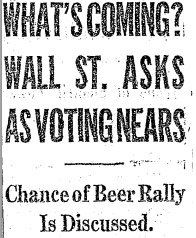One of the bigger but less remarked-upon developments this election season was the passage of two marijuana-legalization amendments, and the inevitable federal-state conflict:
Since Colorado (and Washington state) legalized the use of recreational marijuana last week, the national conversation about what comes next has focused primarily on the obvious conflict between federal and state authority. On the one hand, we have the Controlled Substances Act, the venerable federal statute that for the past four decades has labelled marijuana as a "Schedule 1" substance on par with heroin. And on the other hand we have a clear policy choice made by voters in the election of 2012 that marijuana should be treated like alcohol. There's been a rebellion out west, in other words, which the feds are destined to win.
This reminded me of a Retronaut post from a few weeks ago, which amused a lot of people: the 1932 "We Want Beer" parade.

Eighty years ago today, Jimmy Walker, then the Mayor of New York City, organized a daylong “Beer for Taxation” parade (later known as the “We Want Beer” parade) in objection to the Eighteenth Amendment, which prohibited the manufacture, sale, transport, import, or export of alcoholic beverages. An estimated hundred thousand people attended.
Chicago's Beer for Prosperity gathering drew 40,000 marchers, and most of Daytona Beach, Florida’s 17,000 turned out for its two-mile parade. This one, like others, ended with civil disobedience, as marchers “drank beer from an old-fashioned 20-gallon keg.”
Prohibition had a good deal of popular support. But it also had support from the business community. In the midst of the Depression, and in the wake of Roosevelt's election, the end of Prohibition was spun as a fiscal salve by the big-money boys.
.jpg)
That's from a Tribune dispatch from the convention of the Investment Bankers' Association in October 1932, with the data coming from the association's federal taxation committee, led by Edward Hopkinson of J.P. Morgan. Hopkinson was a man of amusingly blue blood: "the firm is now in the hands of Edward Hopkinson, Jr., whose great-great-great-grandfather was a close friend of Benjamin Franklin, whose great-great-grandfather signed the Declaration of Independence, whose great-grandfather wrote Hail, Columbia, and whose grandfather lived to be the oldest graduate of the University of Pennsylvania."
These were conservative men, who called for big-business tax cuts—in particular, railroad property taxes—during the worst economic crisis the country had ever seen. But they saw logic in the legalization of beer: "On the present estimated consumption of illegal beer a very substantial portion of this tax revenue would not represent additional expenditure on the part of the public but a diversion of funds now going into bootlegging channels." Wall Street got stoked:

The Tribune reported:
It is no secret that majority opinion in Wall street favors the reëlection of President Hoover as the surest means of continuing the prosperity revival movement which undoubtedly has been gathering headway in the last few months. But here of late many authorities have been toying with the idea of a "repeal market" should the election go in favor of the Democratic slate. The more the prospect is discussed the more of an antidote to the current misgivings on the score of a change of administrations does it appear.
Democratic success is generally expected to hasten repeal. Stocks which would be affected by the modification of the Volstead act or the outright repeal of alcohol and bottling stocks in particular, have been showing signs of activity with the approach of the election, and the lengthening of the Roosevelt odds. The possibility is foreseen in some quarters that they might be delegated to lead the market on a new "prosperity" advance, with the bands blaring strains of lighter general taxes and shrinking budget deficits as a result of vast new treasury reciepts from beer taxes. The various business enterprises in line to profit most from a change in the nation's prohibition policy have been laying plans for expansion for some time and ardent repealists have been reassuring the street that Uncle Sam could begin to cash in on legalized beer in short order.
Rallying in the street is one thing; sometimes it takes a rally on the Street to get stuff done.


